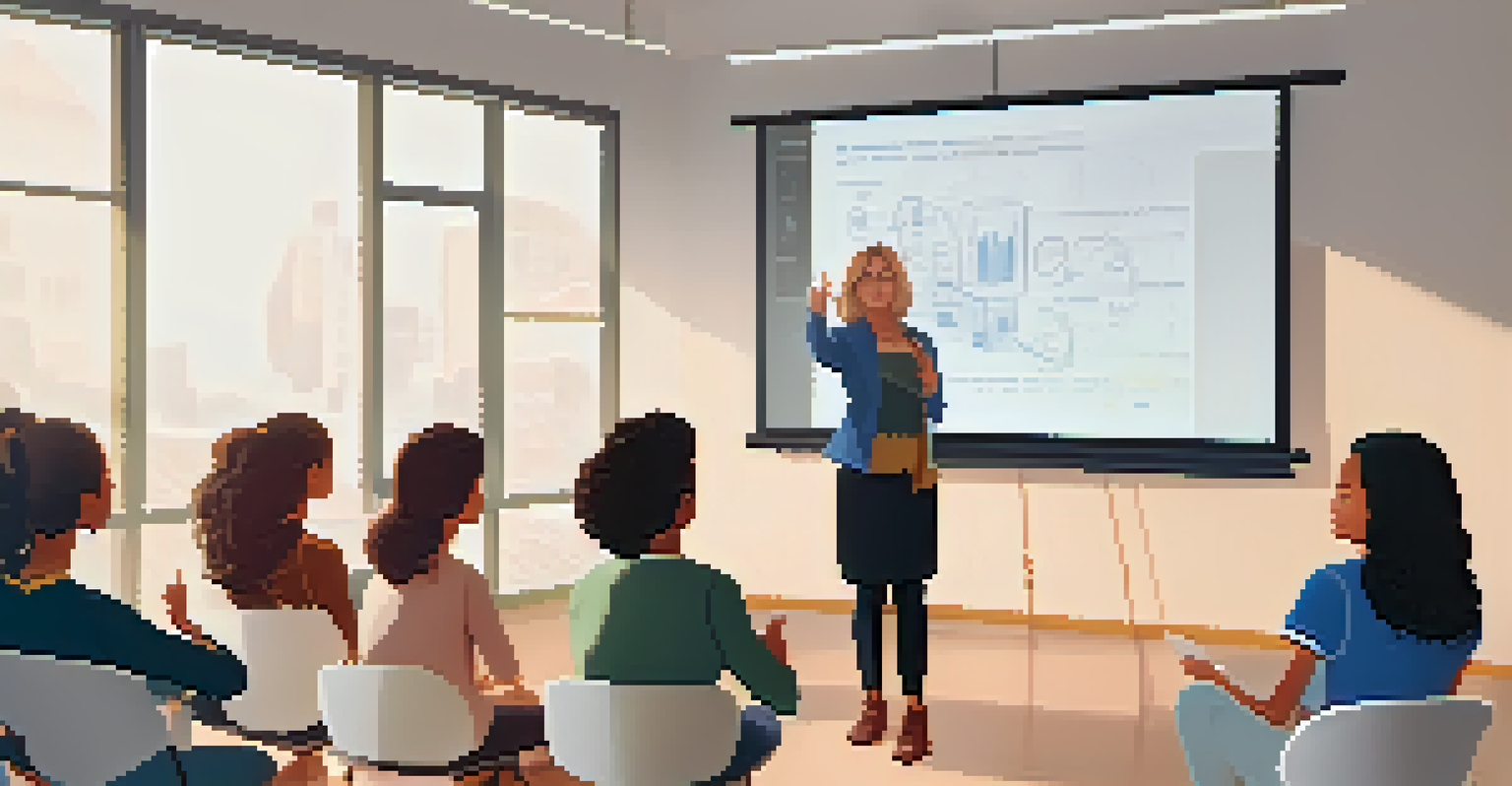Developing Critical Thinking Skills in Online Learners

Understanding Critical Thinking in the Digital Age
Critical thinking is the ability to analyze information objectively and make reasoned judgments. In today’s digital age, where information is abundant and easily accessible, developing this skill is more crucial than ever. Online learners often encounter a mix of reliable and unreliable sources, making it essential to cultivate a discerning mindset.
The ability to think critically is the key to unlocking the potential of the mind.
When students engage with diverse content, they must sift through varying perspectives and data. This process not only enhances their understanding but also equips them to question assumptions and biases. For instance, a learner researching climate change must evaluate different scientific studies to form a well-rounded opinion.
By fostering critical thinking, online learners can better navigate the complexities of information overload. This skill empowers them to become independent thinkers, capable of making informed decisions in both academic and real-world scenarios.
Creating a Supportive Online Learning Environment
A supportive online environment is crucial for fostering critical thinking skills. Instructors can create spaces where learners feel safe to express their ideas without fear of judgment. This involves encouraging open discussions and valuing diverse viewpoints, which can deepen understanding.

For example, using discussion forums allows students to share their thoughts and challenge each other's ideas constructively. Such interactions can lead to richer dialogues and help learners appreciate different perspectives. When students feel heard, they’re more likely to engage critically with the material.
Importance of Critical Thinking
Critical thinking is essential in today's digital age, enabling learners to analyze diverse information and make informed decisions.
Additionally, incorporating collaborative projects can enhance this environment. Group work encourages learners to negotiate ideas and critique each other's reasoning, promoting a culture of critical evaluation and teamwork.
Encouraging Questioning and Curiosity
One effective way to develop critical thinking skills is by encouraging questioning and curiosity. When learners are prompted to ask questions, they become active participants in their education rather than passive recipients of information. This shift can lead to deeper learning.
Curiosity is the engine of achievement.
For instance, an instructor might pose open-ended questions related to the course material, prompting students to explore various angles. Questions like, 'What are the implications of this theory?' can inspire learners to think critically about the subject matter and its real-world applications.
By fostering a culture of inquiry, educators can help students recognize the importance of curiosity in their learning journey. This not only enhances critical thinking but also instills a lifelong love for learning.
Utilizing Real-World Scenarios for Learning
Incorporating real-world scenarios into online courses can significantly enhance critical thinking skills. When learners are presented with practical problems, they are encouraged to apply their knowledge creatively. This approach bridges the gap between theory and practice, making learning more relevant.
For example, a business course might involve case studies that require students to analyze a company's strategy. By evaluating actual business challenges, learners can develop their analytical skills and apply theoretical concepts in a practical context.
Creating Safe Learning Spaces
A supportive online environment fosters critical thinking by encouraging open discussions and valuing diverse viewpoints.
This method not only sharpens critical thinking but also prepares students for real-world decision-making. Understanding how to tackle real-life issues equips them with valuable skills that extend beyond the classroom.
Incorporating Reflective Practices into Learning
Reflective practices are essential for developing critical thinking skills in online learners. Encouraging students to reflect on their learning experiences helps them internalize concepts and evaluate their thought processes. This self-awareness is a key component of critical thinking.
For instance, journals or blogs can serve as effective tools for reflection. When students write about their learning experiences, they can analyze their reasoning and identify areas for improvement. This practice not only fosters critical insights but also builds writing skills.
By integrating reflective practices into the curriculum, educators can promote a deeper understanding of course material. This ongoing reflection encourages learners to consider their viewpoints and adapt their thinking as they progress.
Leveraging Technology to Enhance Critical Thinking
Technology plays a pivotal role in promoting critical thinking among online learners. Digital tools can provide interactive and engaging platforms for students to explore complex ideas. By utilizing these resources, educators can enhance the learning experience and stimulate critical analysis.
For example, online simulations or interactive case studies allow learners to experiment with different scenarios and see the outcomes of their decisions. This hands-on approach encourages them to think critically about their choices and the factors that influence them.
Real-World Application in Learning
Incorporating real-world scenarios into education enhances critical thinking by allowing learners to apply knowledge in practical contexts.
Moreover, technology can facilitate access to a wealth of information and diverse perspectives. By exploring various resources, learners can compare viewpoints and develop their analytical skills in a digital landscape.
Assessing and Evaluating Critical Thinking Skills
Evaluating critical thinking skills in online learners is essential for measuring their progress. Assessments should go beyond traditional tests and encourage students to demonstrate their analytical abilities. Innovative evaluation methods can provide a clearer picture of a learner’s critical thinking capabilities.
For instance, projects that require in-depth analysis or presentations can showcase students’ ability to synthesize information and draw conclusions. Such tasks encourage learners to engage critically with the material and articulate their thoughts effectively.

Additionally, peer assessments can be a valuable tool for evaluating critical thinking. By reviewing each other's work, students can gain insights into different analytical approaches and refine their own thinking processes.